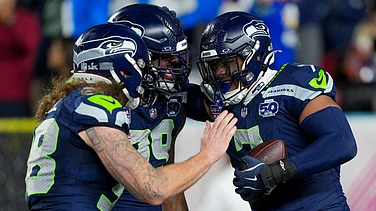To the ignorant, like me, or more kindly, the uninitiated, frisbee was a non serious sport we played as kids, many moons ago. A National Frisbee team with a story to boot? Seriously? Actually yes, pretty seriously.
Ultimate Frisbee has taken a bunch of beach boys, from their shanty town called Urur Kuppam in Chennai, to Bangalore, Hyderabad, Mumbai, Delhi and Ahmedabad. Their next stop is Dubai. And in July, it's London, here we come. Quite a journey for anyone. But particularly scintillating for boys who could not in their wildest dreams have imagined such a path.
The story begins on Eliott's beach, Chennai, where, in 2007, seven people led by Manu Karan, played "ultimate frisbee" every morning. Ultimate Frisbee is a self-refereed, 7 on 7 action sport (like football, but with a plastic disc) — known for its 'spirit of the game'. Nearby, an evening school Pudiyador, was started for underprivileged kids at Urur Kuppam from a neighbouring shanty town. Pudiyador provides a safe environment for these kids whose parents worked late evenings. The kids were encouraged to get involved in various sports. In the beginning, the new sport bore no comparison to the favourites, cricket and football. But slowly they were drawn to the motley group of frisbee fanatics. The rest, as they say, is history. The underprivileged children became addicted to the game and since the beach was just outside their homes, they could practice morning and evening, day and night. And they did, becoming incredibly good at it.
Meanwhile, in Kuala Lumpur, Abhi, an avid Ultimate fan, met Melbourne-to-London cyclist couple, Daniel and Jess, Australians who were running an Ultimate Frisbee camp for Malaysian kids. Abhi invited the Australian duo back to Chennai to coach the beach kids. Here they formed a team of young coaches to train the kids from the nearby shanty town. They found the boys definitely above average in their skills. The super talented kids were chosen to go to Bangalore, Hyderabad, Mumbai and Ahmedabad for Ultimate Frisbee tournaments.

What's really special about this group is the combination of people from different socio- economic backgrounds who play together. There are several young professionals who have bonded with the beach kids. When the game begins, everyone is equal. And for once, money is no barrier. Unlike other sports where power, money and influence are deciding factors, here, the kids who play best are chosen for the teams. The working professionals help the kids save money for tournament expenses. They also help with fund raising and sometimes volunteer to top up the cash shortfall for fares and equipment. Daniel was bursting with pride when he said, "This is a truly national team. In other teams, only those who can afford to go to tournaments make it. Here, we have a team of the best. And it's based solely on skill. Not wealth, class or background. In Ultimate, we take in both genders, in fact, the ratio is compulsorily 4:3. Every team of 7 must have 3 women players".
The story of the underprivileged kids making it big, went viral after a short You tube film 175 grams, won an award at the celebrated Sundance Film festival. It effectively tracks the footsteps of a local lad Ganesan as he talks about the game giving him a new lease of life. He tells us how it took him out of his dreary, economically backward existence, where he went from day to day with little purpose, to new heights he could not have dreamed of, before Ultimate Frisbee changed his world view. " Before, the game", Ganesan begins, "I used to loaf around idly. Steal mangoes with friends. I didn't like my life. Ultimate brought me into contact with so many different people. It changed me."
All the kids talk about their confidence levels surging. Their pride in being the best. The stories of Ganesan, Murugan and other shanty town dwelling teenagers and their interaction with middle class young people like Soumya, an engineering graduate ready to leave for a Masters abroad, is a story within a story.
These underprivileged kids have been mentored, tutored and given a leg-up by their team members. In ordinary circumstances, a girl like Soumya would never have the opportunity to interact with poor boys, or indeed have the slightest inclination to do so. Their worlds are such completely parallel ones. And this is the uniqueness of these 'Ultimate Frisbee encounters'. It has taken average people to a different level where they throw away prejudice and class and wealth barriers.
For the kids, the unbelievable has happened. Playing in Bangalore and Ahmedabad was a huge enough step. But crossing the bridge, flying to Dubai and London is a remarkable journey, at several different complex levels. Its these new horizons looming ahead, the hitherto undreamed of possibilities now open to them, that has given them the incentive to dream dreams. The grit to study, to finish school, to aim for college and pursue a mastery of basic English.
Friends of Ultimate frisbee from all parts of the world are pitching in, moved by the Sundance You tube film 175 grams to sponsor flights, travel and tournament costs, sports gear and their stay abroad. Its a proud moment for Chennai and India.
It would be an even prouder moment if more Indians — individuals, corporates, airlines and government, sponsored these kids who have proved that given an opportunity, they can do anything.
Mari Marcel Thekaekara is an independent writer on social justice issue.

























